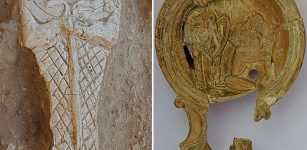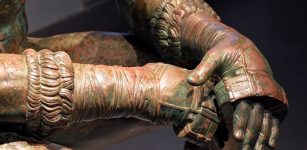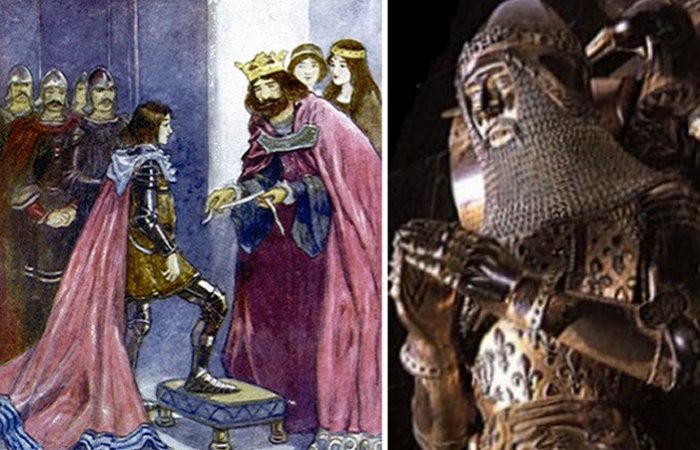Why Is The Black Prince Still A Controversial Historical Figure?
Conny Waters - AncientPages.com - Edward of Woodstock (1330-1376), who became known as the Black Prince was feared, loved, and hated.
As the eldest son and heir of England’s King Edward III Plantagenet, he had a huge responsibility to fight against England’s greatest enemy, France. The Black Prince was very successful on the battlefield and showed tremendous courage. He was also cunning and intelligent and did not hesitate to lure the enemy into a deadly trap if he had a chance to do so.
Left: The Black Prince being made a Knight of the Garter. Credit: Public Domain - Right: The Black Prince. Credit: Public Domain
His battles are well-documented, but there is plenty of disagreement about his personality.
Why is the Black Prince after so many years still a controversial historical figure? Was he a truly evil or good man? Was he a greedy or generous person?
English and French historians present two completely different opinions of the Black Prince, whose tomb can be visited in the Canterbury Cathedral.
How Did The Black Prince Get His Name?
Edward of Woodstock’s nickname is a subject historians fail to agree on. French historians argue that Edward of Woodstock’s nickname can be traced to his dark character. He got the name Black Prince because his soul was black. He showed no mercy and he was heartless when he and his army plundered France.
The English explain the name in much simpler terms. They maintain the name Black Prince originates from the fact that Edward of Woodstock always wore black knight armor in battle.
By doing so, he was easily recognized among other knights dressed in shiny armor.
What Kind Of Person Was The Black Prince?
It would indeed be a surprise to learn the Black Prince’s enemy praised him as a good-hearted person considering how many atrocities he committed in France. It’s no wonder French historians and writers portray the Black Prince as a pure manifestation of evil.
According to contemporary authors, the Black Prince enjoyed conquering his enemies, as well as inflicting emotional and physical pain.
His plundering in France between 1355 and 1356 gave him a very bad reputation.
The French also accuse the Black Prince of being greedy beyond imagination. He left poor peasants and workers without any belongings and ordered the burning of downtowns and cities if inhabitants refused to give him all their possessions. He treated civilians in the most horrible and cruel manner. Chronicle writer jean le Bel said all men in the city of Caen had to witness how their mothers and sisters were murdered. The wife and daughters of each man had to suffer humiliation. As if this was not enough, the Black Prince also ordered the burning of their homes.
According to French historical records, the Black Prince executed 3,000 defenseless men, women, and children in the city of Limoges.
The storming of Limoges. Credit: Public Domain
The English records on the other hand provide the modern world with a much nicer picture of Edward of Woodstock. They explain the Black Prince was a true, generous gentleman who treated people fairly and opposed all kinds of abuses and exploitation.
It was also said that he was faithful to his wife and became furious when his knights mistreated prisoners of war.
Depending on whom you listen to, the English or the French, you’ll learn about the good and bad personality of the Black Prince.
How the Black Prince was in real life is today almost impossible to determine. Ancient sources present conflicting information, are mixed up, and often filled with nonobjective personal opinions.
Written by Conny Waters – AncientPages.com Staff Writer
Updated on August 6, 2021
Copyright © AncientPages.com All rights reserved. This material may not be published, broadcast, rewritten or redistributed in whole or part without the express written permission of AncientPages.com
More From Ancient Pages
-
 Hellenistic Decorated Tombs And Tombstone Probably Used As A False Door Unearthed In Egypt
Archaeology | Jan 10, 2018
Hellenistic Decorated Tombs And Tombstone Probably Used As A False Door Unearthed In Egypt
Archaeology | Jan 10, 2018 -
 Boxer At Rest – Rare Sculpture And Masterpiece Of Hellenistic Bronze Art
Artifacts | May 21, 2021
Boxer At Rest – Rare Sculpture And Masterpiece Of Hellenistic Bronze Art
Artifacts | May 21, 2021 -
 Oldest Evidence To Date: 80,000-Year-Old Stone Blades Of Homo Sapiens Found In Jebel Faya, Arabia
Archaeology | Feb 19, 2025
Oldest Evidence To Date: 80,000-Year-Old Stone Blades Of Homo Sapiens Found In Jebel Faya, Arabia
Archaeology | Feb 19, 2025 -
 Strange Encounter With A Supernatural Being In The 1790s
Ancient Mysteries | Jan 12, 2020
Strange Encounter With A Supernatural Being In The 1790s
Ancient Mysteries | Jan 12, 2020 -
 Takshashila: Renowned Learning Center That Attracted Buddhist Masters, Disciples And Students Of The World
Featured Stories | Sep 13, 2021
Takshashila: Renowned Learning Center That Attracted Buddhist Masters, Disciples And Students Of The World
Featured Stories | Sep 13, 2021 -
 Great Wall Of India: Massive Structure That Surrounds Ancient Fort Of Kumbhalgarh
Featured Stories | Aug 31, 2015
Great Wall Of India: Massive Structure That Surrounds Ancient Fort Of Kumbhalgarh
Featured Stories | Aug 31, 2015 -
 Archaeology Illuminates Chinese Businesses In Eugene
Archaeology | May 23, 2022
Archaeology Illuminates Chinese Businesses In Eugene
Archaeology | May 23, 2022 -
 On This Day In History: Attila The Hun Captures The City of Metz – On Apr 7, 451
News | Apr 7, 2017
On This Day In History: Attila The Hun Captures The City of Metz – On Apr 7, 451
News | Apr 7, 2017 -
 Hadrian’s Wall: North-West Frontier Of The Roman Empire For Nearly 300 Years
Featured Stories | Sep 1, 2020
Hadrian’s Wall: North-West Frontier Of The Roman Empire For Nearly 300 Years
Featured Stories | Sep 1, 2020 -
 Superfood Of Ancient Andeans Reconstructed – What Helped To Fuel The Tiwanaku Civilization 2,500 Years?
Archaeology | Nov 30, 2021
Superfood Of Ancient Andeans Reconstructed – What Helped To Fuel The Tiwanaku Civilization 2,500 Years?
Archaeology | Nov 30, 2021 -
 The Untold Story Of The Inca – Mysterious Place Of The Raised Stones – Part 2
Ancient Mysteries | Jul 5, 2019
The Untold Story Of The Inca – Mysterious Place Of The Raised Stones – Part 2
Ancient Mysteries | Jul 5, 2019 -
 Number 13: Coincidence Or Bad Luck – Are We Still Superstitious?
Featured Stories | Dec 9, 2020
Number 13: Coincidence Or Bad Luck – Are We Still Superstitious?
Featured Stories | Dec 9, 2020 -
 Where Does The Expression “Pyrrhic Victory” Come From?
Ancient History Facts | Apr 18, 2018
Where Does The Expression “Pyrrhic Victory” Come From?
Ancient History Facts | Apr 18, 2018 -
 New Chemical Reactions To Generate Building Blocks Of Proteins And DNA – Discovered
DNA | Jul 29, 2022
New Chemical Reactions To Generate Building Blocks Of Proteins And DNA – Discovered
DNA | Jul 29, 2022 -
 Ancient Fossil Found In Sahara Suggests Loch Ness Monster Could Be Real
Archaeology | Jul 27, 2022
Ancient Fossil Found In Sahara Suggests Loch Ness Monster Could Be Real
Archaeology | Jul 27, 2022 -
 Unique Ancient Man-Made Underground Structure In New England Puzzles Experts – Who Built It And Why?
Featured Stories | Aug 11, 2024
Unique Ancient Man-Made Underground Structure In New England Puzzles Experts – Who Built It And Why?
Featured Stories | Aug 11, 2024 -
 Crusader-Era Sword Discovered At Previously Unknown Burial Site In Finland
Archaeology | Oct 16, 2023
Crusader-Era Sword Discovered At Previously Unknown Burial Site In Finland
Archaeology | Oct 16, 2023 -
 Mystery Of The Roman Tile Kiln At Brandiers Farm Solved!
Archaeology | Aug 18, 2023
Mystery Of The Roman Tile Kiln At Brandiers Farm Solved!
Archaeology | Aug 18, 2023 -
 Statue Of Unknown Mythical Beast With Four Wings Discovered
Archaeology | Sep 1, 2022
Statue Of Unknown Mythical Beast With Four Wings Discovered
Archaeology | Sep 1, 2022 -
 Pre-Inca Societies In The Andes Lacked Hierarchical Leadership And Shared Power Before The Incas Arrived
Archaeology | Dec 13, 2017
Pre-Inca Societies In The Andes Lacked Hierarchical Leadership And Shared Power Before The Incas Arrived
Archaeology | Dec 13, 2017


